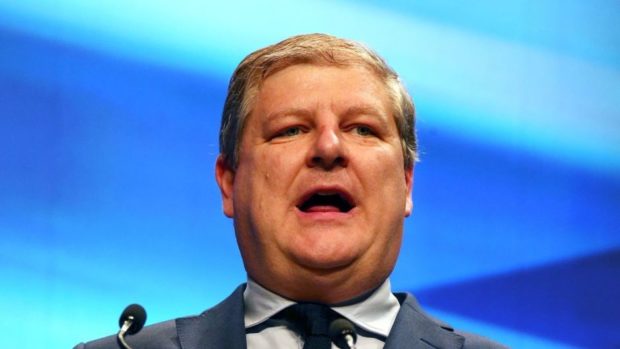The SNP’s Angus Robertson has been condemned for an article arguing the deaths of old people are benefiting the Scottish independence cause.
Mr Robertson, the party’s former Westminster leader who hopes to enter Holyrood, was accused of sinking to a “new low” for the SNP during the coronavirus pandemic.
In an article for the pro-independence National newspaper, the former Moray MP said rising independence support could be explained by Yes-supporting 16-year-olds becoming eligible to vote while No-supporting voters died.
Mr Robertson, who is a close ally of Nicola Sturgeon, wrote: “Since 2014, opinions have clearly not been static, and polls have shown a gradual rise in support for independence.
“This could be significant partly because of the underlying change in the electorate, with roughly 55,000 predominantly Yes supporting 16-year-olds joining the electorate and 55,000 predominantly No supporting older voters passing away every year.”
He added: “Since 2014, this has added around 330,000 voters to the electorate, with a likely net gain of over 100,000 for independence.”
But his remarks caused a storm of criticism from Conservative and Labour politicians.
Mr Robertson said he was presenting “simple statistical facts” and his opponents were guilty of politically motivated and manufactured outrage.
Douglas Ross tweeted: “Disgraceful and deeply disappointing comments from Angus Robertson – suggesting that the most vulnerable age group, who have been hardest hit through the tragic loss of so many lives throughout the pandemic, are a boost to his independence obsession. A new low for the SNP.”
Disgraceful and deeply disappointing comments from @AngusRobertson – suggesting that the most vulnerable age group, who have been hardest hit through the tragic loss of so many lives throughout the pandemic, are a boost to his independence obsession. A new low for the SNP. pic.twitter.com/AK1qtj6Xzg
— Douglas Ross MP (@Douglas4Moray) September 19, 2020
Labour’s health spokeswoman Monica Lennon added: “The man tipped as a successor to Nicola Sturgeon thought this was ok. Not ok @Angus Robertson.”
Lib Dem health spokesman Alex Cole-Hamilton described Mr Robertson’s remarks as “really dark”.
This tweet has now been deleted by @ScotNational.
Thousands of people have been banned from family funerals, older people pressured into signing DNACPRs and COVID-19 cases rising, but the man tipped as a successor to Nicola Sturgeon thought this was ok. Not ok @AngusRobertson. https://t.co/P2o6zc7pYj pic.twitter.com/pj8MZ0H4fD
— Monica Lennon (@MonicaLennon7) September 19, 2020
Mr Robertson, who has been tipped as a future SNP leader, lost his Moray seat in the 2017 General Election, but is now hoping to enter Holyrood and has put his name forward to fight Edinburgh Central.
Did you really write this @AngusRobertson? You really need to think seriously if this is message you want to be sending out. pic.twitter.com/VKlc4GHYB2
— Murdo Fraser (@murdo_fraser) September 19, 2020
Wow. This is really dark.
At least we see you for what you are now, @AngusRobertson 😳👇🏻 pic.twitter.com/oq3heg0HRr— Alex Cole-Hamilton MSP🔶 (@agcolehamilton) September 19, 2020
Mr Robertson said: “I have two elderly parents and like everyone else want the best for them and all older people. I was presenting simple statistical facts about the support for independence amongst different generations in changing society.
“This manufactured outrage and attack on me is demonstrably politically motivated. Andy McIver, the former head of communications for the Scottish Tories, and I made exactly the same point in different articles on the same day. That Tories have only attacked me tells you everything you need to know.”
